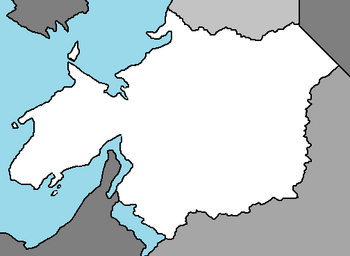Luimnigh: Difference between revisions
No edit summary |
No edit summary |
||
| Line 33: | Line 33: | ||
|largest_settlement_type = <!--Type of settlement if largest settlement not a city--> | |largest_settlement_type = <!--Type of settlement if largest settlement not a city--> | ||
|largest_settlement = <!--Name of largest settlement--> | |largest_settlement = <!--Name of largest settlement--> | ||
|official_languages = | |official_languages = Luimian Gaelic <!--Languages recognised in legislation, constitution, etc--> | ||
|national_languages = <!--Country/territory-wide languages recognised but not necessarily in country/territory-wide law, etc--> | |national_languages = <!--Country/territory-wide languages recognised but not necessarily in country/territory-wide law, etc--> | ||
|regional_languages = <!--Languages recognised or associated with particular regions within the country/territory--> | |regional_languages = <!--Languages recognised or associated with particular regions within the country/territory--> | ||
| Line 45: | Line 45: | ||
|ethnic_groups_year = <!--Year of ethnic groups data (if provided)--> | |ethnic_groups_year = <!--Year of ethnic groups data (if provided)--> | ||
|ethnic_groups_ref = <!--(for any ref/s to associate with ethnic groups data)--> | |ethnic_groups_ref = <!--(for any ref/s to associate with ethnic groups data)--> | ||
|religion = | |religion = Pan-Celtic Paganism <!--Religion--> | ||
|religion_year = <!--Year of religion data (if provided)--> | |religion_year = <!--Year of religion data (if provided)--> | ||
|religion_ref = <!--(for any ref/s to associate with religion data)--> | |religion_ref = <!--(for any ref/s to associate with religion data)--> | ||
|demonym = <!--Term/s describing those associated with the country/territory (e.g. "Belgian" for the country Belgium)--> | |demonym = <!--Term/s describing those associated with the country/territory (e.g. "Belgian" for the country Belgium)--> | ||
|government_type = | |government_type = Federal Parliamentary Constitutional Semi-Absolute Monarchy<!--(often a compound multi-wikilinked term, e.g. "Federal semi-presidential constitutional republic", etc)--> | ||
|leader_title1 = | |leader_title1 = Emperor and for the Parliament, Prime Minister <!--(for a country, usually the head of state's (wikilinked) title, e.g. "President", "Monarch")--> | ||
|leader_name1 = | |leader_name1 = | ||
|leader_title2 = <!--(could be "Vice President", otherwise "Prime Minster", etc, etc)--> | |leader_title2 = <!--(could be "Vice President", otherwise "Prime Minster", etc, etc)--> | ||
Revision as of 20:14, 12 October 2020
The Imperial Federation of Luimnigh, most commonly referred to as Luimnigh or the Imperalistic States by some nations is a country located on the continent of Adula, bordered by Buckingla to the northwest.
History
Early History - Luimnigh started off as a state of various tribal warlords of celtic origin, these people fought over control over the land and its precious resources, only one was close enough to uniting the lands, his name was Patrick Eimear who united the coastal lands into a monarchist kingdom, not much is known about him but he has gone down in history as a forefather of founding the unity of the nation. Sadly, he eventually died and the lands resumed into turmoil for the next centuries to come.
Medieval History (900 AD - 1500 AD) - After centuries of fighting, a major event occured which would transform the land, vast amounts of celts across the world were being forced out of their homes and turned into refugees, they fled to our lands seeking a new life causing an emmense population boom, they saw what had happrned and began to protest and demand change, due to the sheer sizes of people, the governments of the kingdoms were overwhelmed and caused many to collapse or be reformed into elective monarchies, the reforms did not change much at first, but the new refugees came in with vast amounts of new knowledge and technology allowing for a golden age of science to explode in the lands, overtime peace gradually did come to the lands but a lot was still needed to be done.
The Great Development Era (1500 - 1814) - Soon after large population booms occured from the refugees as well as technological progress, many things changes, while colonisation was occuring from other nations, we mainly stayed out of it (also due to us being mainly landlocked). Eventually a duke named Garland O'Neil who had control of one of the most developed places within the various dukedoms and kingdoms set out on a massive military expedition known as the "Great Unification", many wars were fought on much large scales never before seen with new gun and artillery technology at the people's deposal, but it took many years and countless sieges, etc. but with his son, Tailor O'Neil, he was able to finally unite the lands, there was one question though, what should he do with it? Well, he decided to create the offical Luimnigh Constitution of 1743 which declared the Imperial Federation still standing today, dukes had their powers weakened significantly as well as a massive campaign of stabilising the nation through means of force and finally, we were born.



